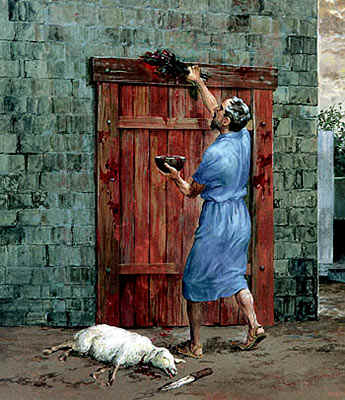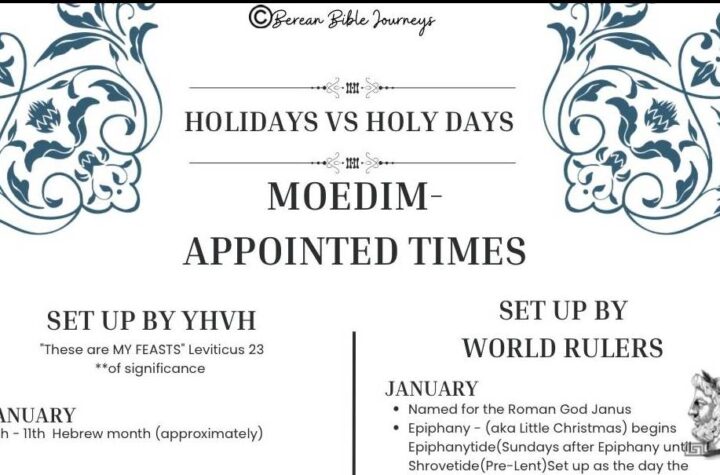
AKA: The Quartodeciman Controversy
When is Easter this year? Why is the yearly date of Easter all over the place from mid-March to late April?
The History of the Passover
Easter was originally the Christian celebration of the Biblical Passover.
The Passover, you may remember, was the event when the Israelites were delivered out of Egypt. They were instructed to sacrifice a lamb on the 14th of their calendar month Nisan, and apply the blood of the lamb to the door-posts of their homes. All that did so were spared the curse of the death of all the firstborn children in Egypt. The angel of death “passed over” those homes where the blood was applied to the door. Moses then led the children of Israel out of Egypt, and they “passed over” the Red Sea on dry land.
Thereafter, every year, the Israelites were instructed to commemorate the Passover on the 14th of Nisan by sacrificing a lamb and eating unleavened bread and bitter herbs as a reminder of their escape from slavery in Egypt. (Exodus 12)
Little did they know, that this same Holy day would culminate in the death of the lamb of God on the cross of Calvary….as Jesus was crucified on the exact anniversary of the original Passover and died on the cross at the time of day when the families would have been sacrificing the lambs in their homes.
Nifty, eh? God doesn’t do anything just for kicks. Everything He does is prophetic and has layers of meaning.
So how did we get Easter?
The date of Passover was originally determined each year by the Jewish peoples based on YHVH’s instructions. Up until around 300 A.D., the memorial was held on the 14th day of the Hebrew month Nisan. However, it became increasingly irksome to many of the church fathers that they were dependent upon the Jews for this date. Jews (the ONE God people) were not favorites of the Pagan societies that had added Christ into their beliefs and rituals. Many of their pagan festivals revolved around the spring equinox, so it was decided to lump the Passover in with the pagan spring season and call it Easter. In this way, they controlled the date and were no longer beholden to the Jewish calendar (aka God’s Calendar).
“Following the church at Rome, they wanted to celebrate Christ’s resurrection on the Sunday following the first full moon of the new year. According to the Julian Calendar, the year began at the vernal or spring equinox. Thus Easter is always a Friday-Sunday celebration, while the 14th of Nisan may fall on a Monday, Wednesday, Friday or Saturday, but never on a Sunday.” (Passover to Easter by Peter Nathan)
Per Emperor Constantine,
“It was decreed unworthy to observe that most sacred festival in accordance with the practice of the Jews….Let there be nothing common between you and the detestable mob of Jews! We have received from the Savior another way; a course is open to our most holy religion that is both lawful and proper. Let us with one accord take up this course, right honourable brothers, and so tear ourselves away from that disgusting complicity. For it is surely quite grotesque for them to be able to boast that we would be incapable of keeping these observances without their instruction.”
In other words, they wanted all the Jewishness taken out of the Passover observance.
At the council of Nicea in 325 AD, the vote passed to embrace Easter (the manmade celebration of Jesus’ resurrection) and outlaw Passover (the commemoration of the Passover, and the ultimate blood-atoning sacrifice of Jesus’ death). This became known as the Quartordeciman Controversy.
Many years later, there were still groups that observed the feasts and kept Passover observance despite the rulings of the Emperor. Unfortunately, around 379-395, Emperor Theodosius ruled that the followers of Passover were forbidden to meet and were punished by the confiscation of property and the death penalty. Wow.

Thus, the date of Easter is not fixed upon the feasts set in place by God but based on the Spring equinox each year. (the name “Easter” comes from the Anglo-Saxon, Eostre, the name of the fertility goddess of spring.) Hint: that’s where the bunnies and eggs come in….symbols of fertility.
You may be asking….”Isn’t Easter in the Bible?” Mentioned once in Acts 12:4. “And when he had apprehended him, he put him in prison, and delivered him to four quaternions of soldiers to keep him; intending after Easter to bring him forth to the people.” This word translated here as Easter, in the King James Version, is the word “Pascha” which actually means “the feast of the Passover”.
In short, since 325 AD, the mainstream churches have passed over Passover in support of Roman-decreed Easter. I marvel that pastors do not revisit this subject, research the truth, and reinstate Passover in lieu of Easter. They would most certainly lose some people over eggs and bunnies, but my, what richness they would gain from following God’s calendar. Upon learning this history, I managed to push the info aside for a couple of years before coming across this verse where Jesus told them plainly, “You have a fine way of setting aside the commands of God in order to observe your own traditions!” (Mark 7:9) Ouch.

Further Reading: https://vineyardjc.com/quartodeciman-controversy/
Follow along in the next few days as we discover the basics of observing Passover in the Biblical way. Leave your email if you are interested.






More Stories
Holy Days / Holidays Comparison
Lucifer’s Career Goals
Come Out of Her